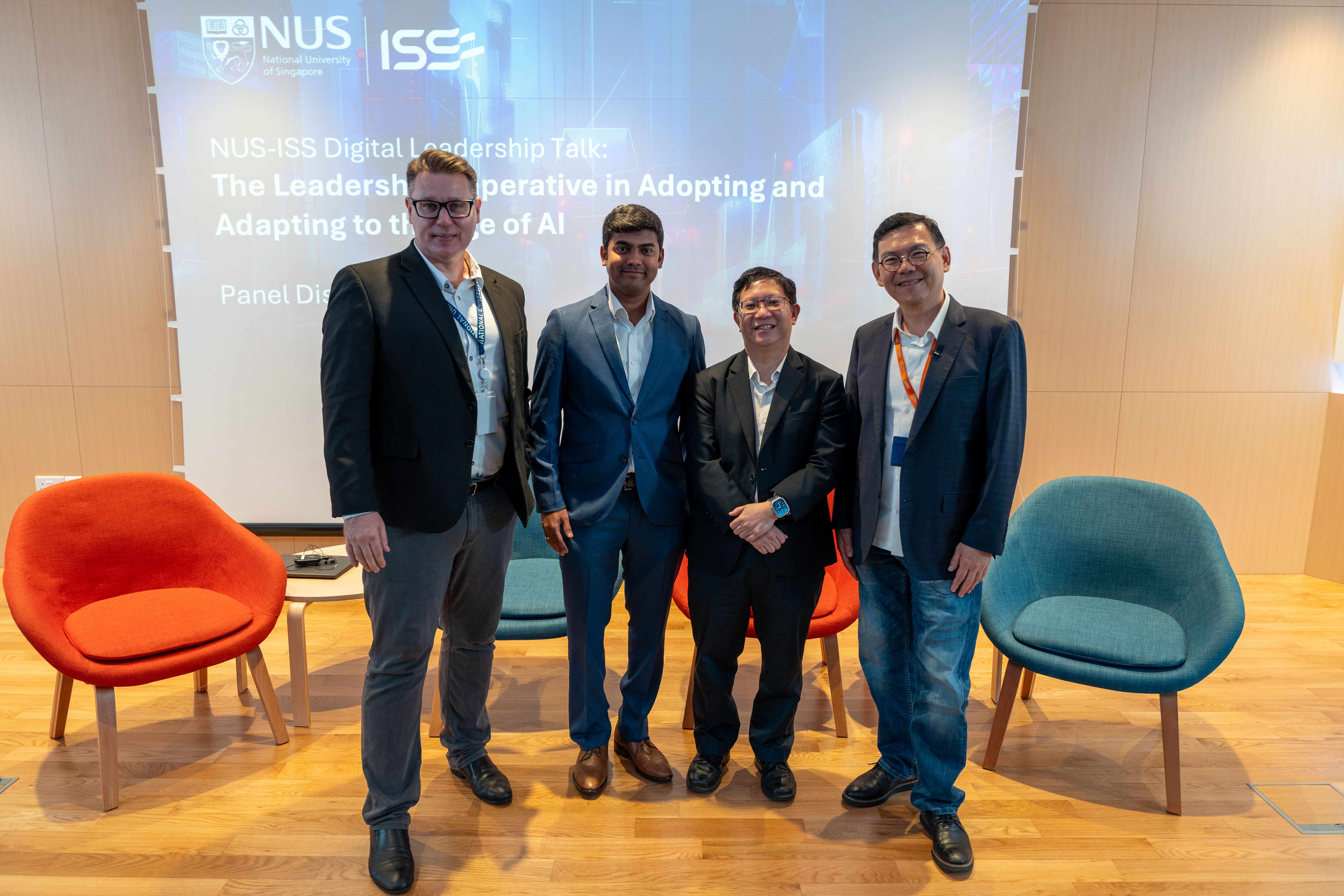You're going about your daily work, handling tasks you've done a hundred times before. Then suddenly there is a new AI tool that can easily do this.

From L to R: Mr Damien Cummings, Chief of Digital Strategy & Leadership Practice, NUS-ISS; Mr Kamraj Subramanian, Data Transformation Manager at Singtel; Mr Thaddaeus Lee, Managing Director, Strategic Planning (Asia Pacific Division), Sumitomo Mitsui Banking Corporation; and Dr Leong Mun Kew, Director of Graduate Programmes, NUS-ISS; speaking at a panel discussion, titled “The Leadership Imperative in Adopting and Adapting in the Age of AI”.
The machines are getting smarter, and the nature of work is shifting under our feet. A question on many employees’ minds: As AI continues to evolve, will I cease to be relevant?
The short answer is no, said Mr Thaddaeus Lee, Managing Director of Strategic Planning at the Asia Pacific Division of Sumitomo Mitsui Banking Corporation.
“The reason is simple: humans are a resilient species,” he added, drawing parallels to past technological revolutions like the computer and mobile phone. “There’s always going to be a displacement of workers who can’t catch up. But those who can navigate, retrain, upskill themselves will never get phased out of the system.”
Speaking at a panel discussion, titled “The Leadership Imperative in Adopting and Adapting in the Age of AI”, Mr Lee and other industry experts delved into the future of work in an AI-driven world. They offered invaluable advice on how to not just survive but thrive in this new era, and answered burning questions from the attendees.
The session, led by Mr Damien Cummings, Chief of Digital Strategy & Leadership Practice at NUS-ISS, also featured Dr Leong Mun Kew, Director of Graduate Programmes at NUS-ISS; and Mr Kamraj Subramanian, Data Transformation Manager at Singtel.
Is your job safe from AI?
As AI continues to transform industries and redefine job roles, many workers are wondering if their positions could be next on the chopping block. Mr Subramanian outlined four key indicators to assess whether your job might be at risk of being taken over by AI.
- Sign #1: “If a skill can be automated, it’s likely that AI will eventually handle it,” he says, explaining that jobs like data entry are particularly vulnerable, as AI can perform these tasks efficiently. “However, roles that require data analysis, where insights are drawn and decisions are made, are becoming more crucial and less likely to be fully automated.”
- Sign #2: Jobs that involve basic tasks, such as simple animation or design, are increasingly at risk as generative AI becomes more capable, Mr Subramanian says. But AI still struggles with tasks that require innovative thinking and creativity. “For example, creating unique, brand-defining campaigns is something that AI can’t replicate, making these skills valuable.”
- Sign #3: While many customer service roles can be automated, jobs that require deep expertise and complex problem-solving, such as customer relationship management, are less likely to disappear. Mr Subramanian foresees that such roles will remain vital, though the nature of the work may evolve with AI tools making tasks easier.
- Sign #4: Currently, AI falls short when it comes to areas like critical thinking and complex decision-making. While routine tasks like manual testing are being automated, AI-augmented roles, such as software engineering, are the future. These roles will leverage AI to handle simpler tasks, freeing up professionals to focus on solving more intricate problems.
Why you need your own AI
For AI startups that have hopped on the bandwagon, Mr Cummings flagged a critical concern: the risk of not developing proprietary technology. Not mincing his words, he offered a stark warning to those building businesses as mere layers on existing AI platforms like ChatGPT.
“These startups are essentially adding a layer of functionality on top of existing AI models, which means they have little to no control over the underlying technology,” Mr Cummings said. This dependency is risky. “If the AI platform they rely on changes a feature, or worse, withdraws its service from markets like Singapore, these startups could lose their entire business overnight.”
He explained: “Large, faceless tech companies, especially those based in the United States, don’t care about small businesses in Singapore. As soon as the regulatory environment changes, or it becomes a little bit risky for them, they won’t hesitate to abandon you.”
The time is now
Summing up the discussion, Dr Leong highlighted the urgency of embracing AI. He likened the rapid advancement of technology to exponential growth – a concept that, once understood, makes the stakes clear.
“If I'm one day ahead of you growing exponentially, you'll never catch up," he explained. The implication is straightforward: the longer you delay adopting AI, the harder it will be to compete. Even small competitors who leverage AI today could outpace larger, more established businesses that hesitate.
Addressing the issue of the cost of AI adoption, Dr Leong drew a parallel to a domain he’s deeply familiar with. “Education isn't cheap. Not having an education is more expensive,” he said. “(Similarly), while the upfront investment in AI may be significant, the cost of ignoring it is far greater.”
For more information on NUS-ISS Executive Education Programmes in Artificial Intelligence, visit here.
Find out more about the NUS-ISS Master of Technology in Artificial Intelligence Systems Programme.
Interested in a flexible study option? Learn more about the NUS-ISS Stackable Graduate Certficate Programme in Artificial Intelligence which stacks up towards the Master of Technology in Artificial Intelligence Systems degree.